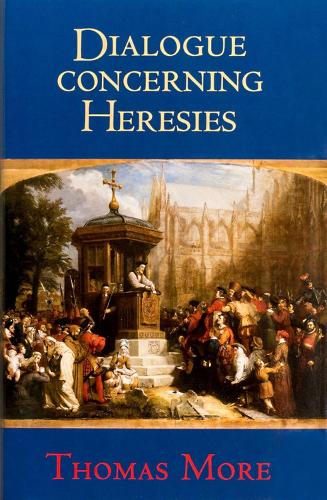
Dialogue Concerning Heresies
(Paperback)
Publishing Details
Dialogue Concerning Heresies
Scepter Publishers Inc
Scepter Publishers Inc
13th March 2007
United States
Classifications
Physical Properties
Paperback
491
Width 139mm, Height 215mm
Description
Considered by C.S. Lewis as perhaps the best dialogue written in English, this friendly, spirited, and often merry exchange takes place at St. Thomas More' s peaceful and cultured home in Chelsea.
St. Thomas More's Dialogue Concerning Heresies is a conversation between the experienced humanist and statesman More and an intelligent college student who has been influenced by the spirit and ideas of the new men and reformers, especially Martin Luther and William Tyndale. It addresses questions that continue to be discussed today:
Isn' t it idolatry to pray to saints, venerate images, and go on pilgrimagesWhy listen to what the Church teaches Shouldn' t we go only by Scripture, since it is the word of GodWhy didn' t the Church want laypeople to have their own Bible, and in EnglishHow do we know which church is the true oneWhy waste time on philosophy and other secular studies if the Bible is God' s revealed word
This modernized edition of More' s Dialogue brings this masterful work into wide circulation for the first time since its publication in 1529.
Author Bio
St. ThomasMore was an English lawyer,social philosopher, author,statesman, and notedRenaissance humanist. He was a Councillor toHenry VIII, andLord High Chancellor of Englandfrom October 1529 to May 1532. He is known for his 1516 bookUtopiaand for his death in 1535, after refusing to acknowledge King Henry VIII as head of the Church of England. He was canonized by the Catholic Church as a saint in 1935.More opposed theProtestant Reformation, in particular the theology ofMartin LutherandWilliam Tyndale. More also opposed the king's separation from theCatholic Church, refusing to acknowledge Henry asSupreme Head of the Church of Englandand the annulment of his marriage toCatherine of Aragon. After refusing to take theOath of Supremacy, he was convicted oftreasonand beheaded. Of his execution, he was reported to have said: "I die the King's good servant, and God's first."Pope Pius XIcanonized More in 1935 as amartyr.Pope John Paul IIin 2000 declared him the "heavenlyPatronof Statesmen and Politicians."
